高考英语情态动词专题复习
- 格式:doc
- 大小:107.00 KB
- 文档页数:17

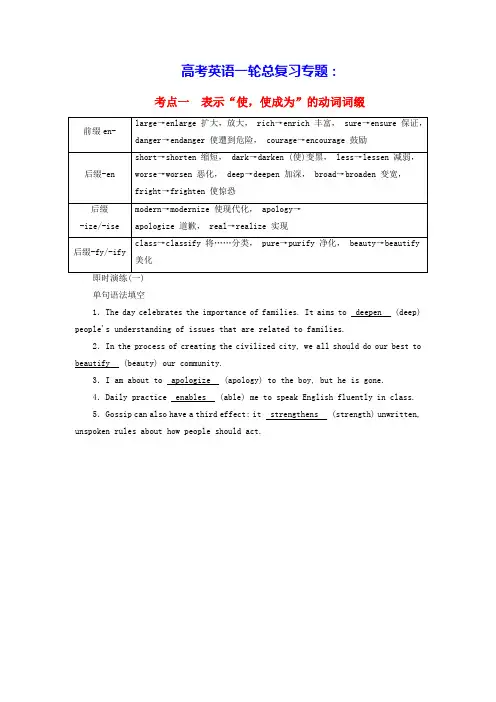

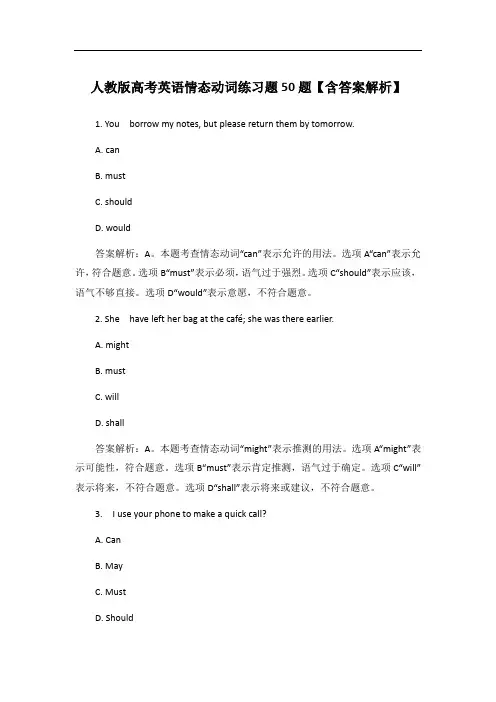
人教版高考英语情态动词练习题50题【含答案解析】1. You borrow my notes, but please return them by tomorrow.A. canB. mustC. shouldD. would答案解析:A。
本题考查情态动词“can”表示允许的用法。
选项A“can”表示允许,符合题意。
选项B“must”表示必须,语气过于强烈。
选项C“should”表示应该,语气不够直接。
选项D“would”表示意愿,不符合题意。
2. She have left her bag at the café; she was there earlier.A. mightB. mustC. willD. shall答案解析:A。
本题考查情态动词“might”表示推测的用法。
选项A“might”表示可能性,符合题意。
选项B“must”表示肯定推测,语气过于确定。
选项C“will”表示将来,不符合题意。
选项D“shall”表示将来或建议,不符合题意。
3. I use your phone to make a quick call?A. CanB. MayC. MustD. Should答案解析:B。
本题考查情态动词“may”表示请求许可的用法。
选项B“May”表示请求许可,语气较为正式和礼貌,符合题意。
选项A“Can”也可以表示请求许可,但语气不如“May”正式。
选项C“Must”表示必须,不符合题意。
选项D“Should”表示应该,不符合题意。
4. He speak three languages fluently when he was younger.A. couldB. mightC. mustD. should答案解析:A。
本题考查情态动词“could”表示过去能力的用法。
选项A“could”表示过去的能力,符合题意。
选项B“might”表示可能性,不符合题意。
选项C“must”表示肯定推测,不符合题意。
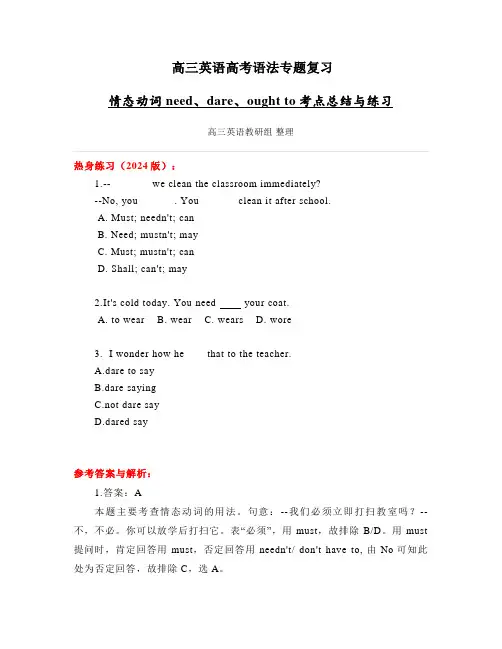
高三英语高考语法专题复习情态动词need、dare、ought to考点总结与练习高三英语教研组整理热身练习(2024版):1.--_______ we clean the classroom immediately?--No, you ______. You ______ clean it after school.A. Must; needn't; canB. Need; mustn't; mayC. Must; mustn't; canD. Shall; can't; may2.It's cold today. You need your coat.A. to wearB. wearC. wearsD. wore3. I wonder how he ___ that to the teacher.A.dare to sayB.dare sayingC.not dare sayD.dared say参考答案与解析:1.答案:A本题主要考查情态动词的用法。
句意:--我们必须立即打扫教室吗?--不,不必。
你可以放学后打扫它。
表“必须”,用must,故排除B/D。
用must 提问时,肯定回答用must,否定回答用needn't/ don't have to, 由No可知此处为否定回答,故排除C,选A。
2.答案:Aneed作实义动词时,后接不定式作宾语,need to do sth. 需要做某事,故选A。
3. 答案:Ddare既可作实义动词,也可做情态动词。
1)作实义动词时,其后既可接to,也可不接to.2) 做情态动词,后不接to,直接接动词原形A.dare to say 有to,这时dare是实义动词,因为主语是he,那么应该有人称或时态的变化,但是dare是原形,所以排除。
B. dare saying, dare后面不管加不加to都跟动词原形,所以排除。
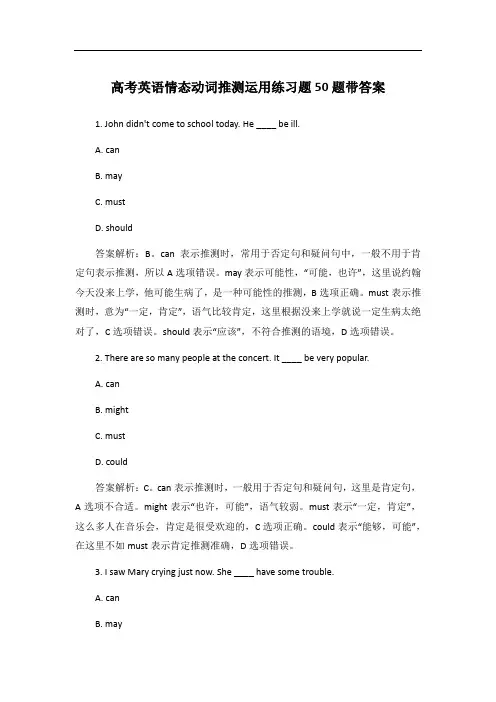
高考英语情态动词推测运用练习题50题带答案1. John didn't come to school today. He ____ be ill.A. canB. mayC. mustD. should答案解析:B。
can表示推测时,常用于否定句和疑问句中,一般不用于肯定句表示推测,所以A选项错误。
may表示可能性,“可能,也许”,这里说约翰今天没来上学,他可能生病了,是一种可能性的推测,B选项正确。
must表示推测时,意为“一定,肯定”,语气比较肯定,这里根据没来上学就说一定生病太绝对了,C选项错误。
should表示“应该”,不符合推测的语境,D选项错误。
2. There are so many people at the concert. It ____ be very popular.A. canB. mightC. mustD. could答案解析:C。
can表示推测时,一般用于否定句和疑问句,这里是肯定句,A选项不合适。
might表示“也许,可能”,语气较弱。
must表示“一定,肯定”,这么多人在音乐会,肯定是很受欢迎的,C选项正确。
could表示“能够,可能”,在这里不如must表示肯定推测准确,D选项错误。
3. I saw Mary crying just now. She ____ have some trouble.A. canB. mayC. mustD. should答案解析:C。
can用于推测时一般不用于肯定句,A选项错误。
may表示可能性,“可能”,但这里看到玛丽哭了,肯定是有麻烦了,用must更合适,C选项正确,B选项错误。
should表示“应该”,不符合推测有麻烦的语境,D选项错误。
4. The ground is wet. It ____ have rained last night.A. canB. mayC. mustD. should答案解析:C。
can表示推测常用于否定句和疑问句,A选项错误。
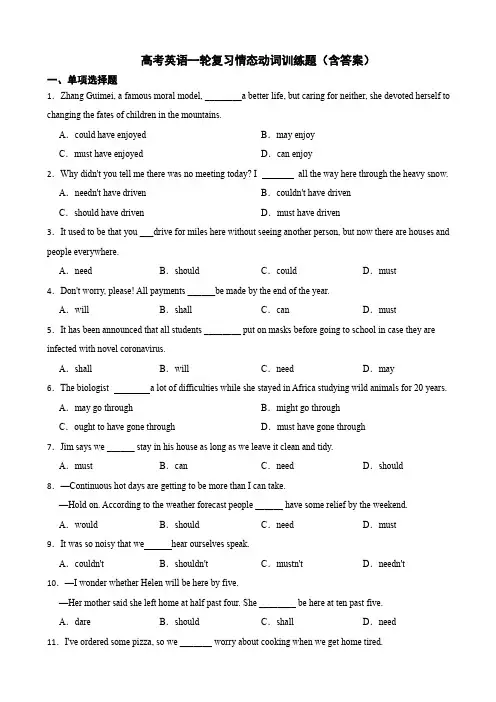
高考英语一轮复习情态动词训练题(含答案)一、单项选择题1.Zhang Guimei, a famous moral model, ________a better life, but caring for neither, she devoted herself to changing the fates of children in the mountains.A.could have enjoyed B.may enjoyC.must have enjoyed D.can enjoy2.Why didn't you tell me there was no meeting today? I all the way here through the heavy snow.A.needn't have driven B.couldn't have drivenC.should have driven D.must have driven3.It used to be that you ___drive for miles here without seeing another person, but now there are houses and people everywhere.A.need B.should C.could D.must4.Don't worry, please! All payments ______be made by the end of the year.A.will B.shall C.can D.must5.It has been announced that all students ________ put on masks before going to school in case they are infected with novel coronavirus.A.shall B.will C.need D.may6.The biologist a lot of difficulties while she stayed in Africa studying wild animals for 20 years.A.may go through B.might go throughC.ought to have gone through D.must have gone through7.Jim says we ______ stay in his house as long as we leave it clean and tidy.A.must B.can C.need D.should 8.—Continuous hot days are getting to be more than I can take.—Hold on. According to the weather forecast people ______ have some relief by the weekend.A.would B.should C.need D.must9.It was so noisy that we hear ourselves speak.A.couldn't B.shouldn't C.mustn't D.needn't10.—I wonder whether Helen will be here by five.—Her mother said she left home at half past four. She ________ be here at ten past five.A.dare B.should C.shall D.need11.I've ordered some pizza, so we _______ worry about cooking when we get home tired.A.can't B.dare not C.needn't D.may not 12.— Henry was forced to leave for the invalid visa.— He __________the period of timeA.should have extended B.must have extendedC.may have extended D.would have extended 13.Whatever _______happen, we are not going to give up our determined plan.A.may B.must C.can D.should 14.Imitating others' actions in Tik Tok _____ be very dangerous, so you can't be too careful.A.should B.shall C.might D.can 15.— Will the monthly allowance of $ 500 cover all your living expenses?— I ________ have no problem with money, as I am quite good at handling it.A.might B.should C.could D.would 16.— It's really a pity that you didn't go to see Frozen II last night.— I ________, but I had to prepare for the coming exam.A.would like to B.ought to C.would have D.should have 17.Playing computer games cost the boy plenty of time he ________ have spent doing his lessons.A.ought to B.shall C.may D.must 18.We _______ the assignment ahead of time had you explained the objective to us earlier A.could completed B.would completeC.should complete D.could have completed19.—I didn't know you were good friends.—You _______. I have known her since she moved here. You were studying abroad then.A.may have B.needn't have C.couldn't have D.must have 20.—It's so hot and uncomfortable here! Why are your windows still closed?—Oh, I'm not to blame. They _______ open.A.shan't B.mustn't C.won't D.wouldn't 21.—Why did Mary ignore me at the party last night?—She you. She wasn't wearing her glasses.A.shouldn't have seen B.needn't have seenC.won't have seen D.might haven't seen22.—You really did a good job, Robert!—I was just doing my job and anyone in my position ________ the same like me.A.might do A B.could doC.should have done D.would have done23.He slept like a log through all the noise—he ________ very tired.A.must be B.might have beenC.might be D.must have been24.There is no light in Smith's room. Therefore, he ________ be at home.A.wouldn't B.mustn't C.shouldn't D.can't25.— Why do you care about him so much?— You ________him when he first came out— it was so sad.A.would have seen B.should have seenC.might have seen D.could have seen26.Interested in painting, he ________ paint with pen and paper after work, gradually cultivating himself into a selftaught painter.A.would B.must C.might D.should27.Now that he'd come to the door, he thought he _______ as well go in with the others to have a look.A.might B.could C.should D.must28.I wonder what makes TikTok appeal to people of all ages. People have wasted so much of their time which _______ for other more meaningful things.A.could have been saved B.would be savedC.must have been saved D.should be saved29.If students don't take headmaster's advice offered at the graduation ceremony seriously, they _______ pay a considerable price in the years ahead.A.must B.may C.can D.should30.—I phoned you yesterday morning. A girl answered, but I didn't recognize the voice.—Oh, it ________ my younger sister. She was in my room at that moment.A.must have been B.should have beenC.could have been D.may have been31.—Are you going on a holiday after the exam?—Well, I haven't decided yet. I ________ find some other choices.A.would B.might C.must D.should32.The room is so clean. He ________ have cleaned it yesterday evening.A.will B.need C.can D.must33.Days later, my brother called to say he was all right, but ________say where he was.A.mustn't B.shouldn't C.wouldn't D.mightn't34.It wasn't right to me that such near neighbors ________ not know one another.A.could B.would C.should D.might35.—Will you read me a story, Mummy?—OK. You ________ have one if you go to bed as soon as possible.A.might B.must C.could D.shall36.—I spend two weeks in Beijing last year.—Then you must have visited the Great Wall during your stay, ________ you?A.mustn't B.didn't C.haven't D.hadn't37.Since we can do nothing about it, we ________ as well consult Mr. Smith about the matter.A.can B.must C.need D.may38.The law is equally applied to everyone. No one ________ be above it.A.shall B.must C.may D.need39.— Excuse me, do you mind if I open the window?— Well, if you . I can put on more clothes.A.can B.may C.must D.shall40.Frankly speaking, I am not sure whether I ________ this in the old days with that kind of equipment, which looks quite odd and ridiculous.A.should have done B.need have doneC.would have done D.must have done答案1.A 2.A 3.C 4.B 5.A 6.D 7.B 8.B 9.A 10.B 11.C 12.A 13.A 14.D 15.B 16.C 17.A 18.D 19.C 20.C 21.D 22.D 23.D 24.D 25.B 26.A 27.A 28.A 29.B 30.A 31.B 32.D 33.C 34.C 35.D 36.B 37.D 38.A 39.C 40.C。
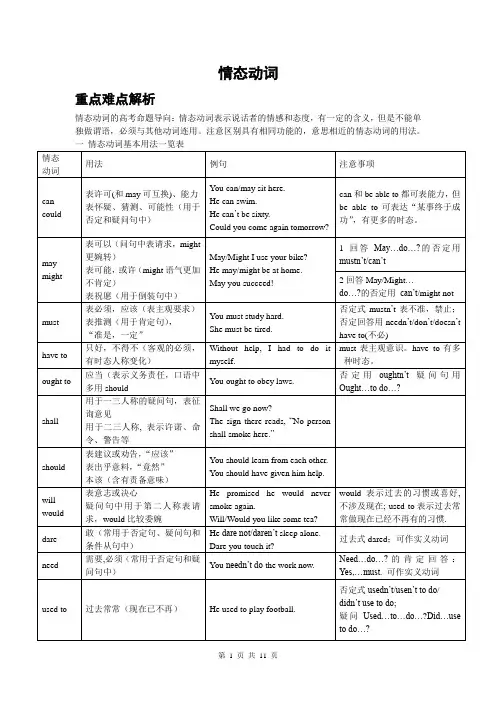
情态动词重点难点解析情态动词的高考命题导向:情态动词表示说话者的情感和态度,有一定的含义,但是不能单独做谓语,必须与其他动词连用。
注意区别具有相同功能的,意思相近的情态动词的用法。
二“情态动词+进行式”和“情态动词+完成式”用法一览表填入情态动词的恰当形式或根据括号所提供的词填入情态动词恰当的结构。
1. I should have been there, but I ____________ find the time.2. Helen _______ go on the trip with us, but she isn’t quite sure yet.3. Tom, you ___________ not leave all your clothes on the floor like this!4. You can’t imagine that a well behaved gentleman _____________ be so rude to a lady.5. It has been announced that candidates_____________ remain in their seats until all thepapers have been collected.6. ---Lucy doesn’t mind lending you her dictionary.---She ____________. I’ve already borrowed one.7. John, look at the time. _______________ you play the piano at such a late hour?8. ---__________ this book be yours?---No, it ____________ not be mine. It ___________ be his.9.As a girl, she ____________ get up at six every day.10.__________ he to clean the classroom after school?11.You ____________ be tired after the long trip, aren’t you?12.---What’s the name?---Khulaifi. __________ I spell that for you?13.You _____________________ (see) the film, haven’t you?14.You _____________________ (talk) on the phone at that time, for I couldn’t get through.15.They _____________________ (miss) the plane, or perhaps they have been prevented fromcoming for some reason.16.______________ you pass the college entrance examinations!17.He had known the matter before you told him, so you _________________ (not tell) it to him.虚拟语气重点难点解析虚拟语气的高考命题导向:虚拟语气表示说话人的愿望、假设、猜测或建议,而不是表示客观存在的事实。
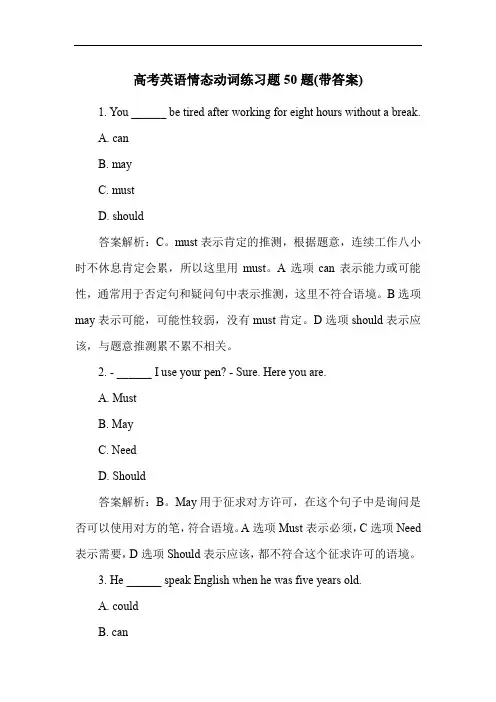
高考英语情态动词练习题50题(带答案)1. You ______ be tired after working for eight hours without a break.A. canB. mayC. mustD. should答案解析:C。
must表示肯定的推测,根据题意,连续工作八小时不休息肯定会累,所以这里用must。
A选项can表示能力或可能性,通常用于否定句和疑问句中表示推测,这里不符合语境。
B选项may表示可能,可能性较弱,没有must肯定。
D选项should表示应该,与题意推测累不累不相关。
2. - ______ I use your pen? - Sure. Here you are.A. MustB. MayC. NeedD. Should答案解析:B。
May用于征求对方许可,在这个句子中是询问是否可以使用对方的笔,符合语境。
A选项Must表示必须,C选项Need 表示需要,D选项Should表示应该,都不符合这个征求许可的语境。
3. He ______ speak English when he was five years old.A. couldB. canC. mayD. must答案解析:A。
could是can的过去式,表示过去的能力,句中提到他五岁的时候,是过去的时间,所以用could表示过去能说英语。
B选项can表示现在的能力。
C选项may表示可能,D选项must表示肯定的推测,都不符合这里表示过去能力的语境。
4. - Where is Tom? - He ______ be in the library. I'm not sure.A. canB. mayC. mustD. should答案解析:B。
may表示可能性,根据I'm not sure可知说话者不确定,只是一种可能,所以用may。
A选项can用于否定句和疑问句中表示推测,这里是肯定句。
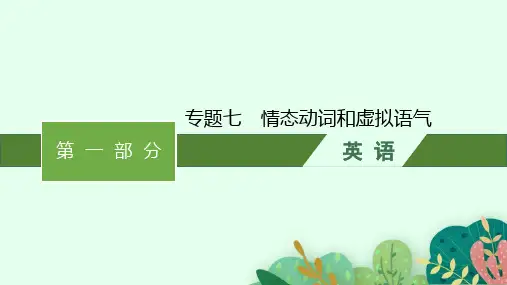

高考英语情态动词练习题50题答案解析版1. The research report says that there must be life on that planet.- may- might- could- must答案解析:must 表示非常肯定的推测,语气最强。
may、might、could 表示可能性,语气依次减弱。
在这个句子中,研究报告说那个星球上“一定有生命”,must 符合语境。
2. The strange phenomenon in the sky could be a UFO.- must- might- should- can答案解析:could 表示有可能,语气较弱。
must 语气最强,表示非常肯定;might 语气比could 还弱一些;should 表示应该,不是推测。
在这个句子中,天空中的奇怪现象“可能是”不明飞行物,could 比较合适。
3. The missing person may be in this area.- must- might- should答案解析:may 表示有可能,语气比could 稍强一点。
must 语气最强;might 语气最弱;should 表示应该,不是推测。
在这个句子中,失踪的人“可能在”这个区域,may 符合语境。
4. The scientist said that it might rain tomorrow.- must- may- could- might答案解析:might 表示可能性很小,语气最弱。
must 语气最强;may 语气比might 稍强;could 语气也较弱。
在这个句子中,科学家说“可能会”下雨,might 符合语境。
5. The animal tracks in the snow could indicate a large predator.- must- might- should- can答案解析:could 表示有可能,语气较弱。
高考英语语法复习专题8 情态动词和虚拟语气精品导学案(含解析)情态动词主要用来表示说话人的情感、态度等,是中学英语语法的重点,也是高考的热点,是单项填空必考的一个知识点。
情态动词在近五年高考中主要考查四点:情态动词表示推测和可能性的用法;情态动词与虚拟语气;情态动词表达“情感、态度、语气等”;情态动词表示“必要性”等方面的用法。
虚拟语气的考点主要集中在名词性从句、条件句中的用法,以及错综条件句中虚拟语气的应用。
一、情态动词表推测的用法注意:should (ought to)表示推测是高考考查的重点和难点。
如:—When can I come for the photos?I need them tomorrow afternoon. —They ________ be ready by 12:00.A.can B.should C.might D.need【解析】B A项表示推测时常用于否定句和疑问句中。
C项表示推测语气不太肯定。
should意为“按理说,理应”,既回答了顾客的询问,不失礼貌,又为照片有可能尚未洗好,顾客到时取不到留下了回旋的余地,体现了店主的精明与用词经过仔细推敲。
二、情态动词的其他用法1.can, could, may, might2.must, should3. need, dare4.shall/will/would4.shall/will/would4.shall/will/would二、情态动词+have done四、虚拟语气虚拟语气表示说话人所说的话不是事实,而是一种假设、愿望、怀疑或推测。
1.虚拟语气在条件句中的用法If it were to rain tomorrow, I should not drive my car. 如果明天下雨的话,我就不开车了。
(明天的情况还不知道)If I had done it in time, I should have had a good time. 如果我及时做的话,日子就好过多了。
1 / 17 情态动词精品学案 情态动词解读: ① 本身有一定的词义,表示说话人的情绪、态度或语气的动词。 ② 不能单独作谓语。 ③ 和其他动词原形构成谓语。 ④ 谓语动词之前。 ⑤ 无人称和数的变化。 ⑥ 否定式构成是在情态动词后面加“not”。 ⑦ 个别情态动词有现在式和过去式两种形式,过去式可以用来表达更加客气、委婉的语气,时态性不强,可用于过去,现在或将来。 经典例句: We can be there on time tomorrow. 我们明天能按时去那儿。 May I have your name? 我能知道你的名字吗? Shall we begin now? 我们现在就开始吗? How dare you treat us like that! 你怎么敢那样对待我们! We can't carry the heavy box. 我们搬不动那箱子。 情态动词考点:
1. 情态动词表示推测。 2. 情态动词的基本用法。 3. 情态动词的答语。 2 / 17
常见情态动词: 情态动词有can (could), may (might), must, have to, shall (should, will (would), dare (dared), need (needed), ought to等。 情态动词的基本用法:
一、 can, could 1) 表示能力(体力、知识、技能)时,等于be able to 。 a) Can you lift this heavy box?(体力) b) Are you able to lift this heavy box? c) Mary can speak three languages.(知识) d) Is Mary able to speak three languages? e) Can you skate?(技能) 此时可用be able to代替。
2) can表示请求和允许。 -----Can I go now? ----- Yes, you can. / No, you can’t. 此时可与may互换。在疑问句中还可用could, might代替,不是过去式,只是语气更委婉,不能用于肯定句和答语中。(特别注明:这是在表示请求和允许的时候。)
---- Could I come to see you tomorrow? ---- Yes, you can. ( No, I’m afraid not. ) can't在否定句中可以表示命令,不允许,但是语气比mustn't弱,具有劝慰的意思. 3)can表示“有时会”: A kind person can lose temper sometimes. 4)表示与五种感官和知觉的动词连用。 I can hear/ see you clearly from here. You can imagine how annoyed she was ! 3 / 17
5)can 与be able to 的区别 ①Can只有一般现在时(can)和一般过去式(could);而be able to则有更多的时态。 I’ll not be able to come this afternoon. ②当表示“经过努力才得以做成功某事(此事一般是一次性的,具体指的是某件事经过努力做成了)”时应用be able to,不能用Can。 经典例句:
He was able to go to the party yesterday evening in spite of the heavy rain. He was able to survive the fire because he was brave. 经典练习
1.(2010全国卷I 29). Just be patient .You_____________ except the world to change so soon. A. can’t B. needn’t C. may not D. will not 3. (2009北京卷) One of the few things you ___ say about English people with certainty is that they talk a lot about the weather. A. need B. must C. should D. can 4. The fire spread through the hotel very quickly but everyone __________ get out. A. had to B. would C. could D. was able to 5.【2012全国卷II】⒘ I’m going to Europe on vacation together with John if I ___ find the money. A. can B. might C. would D. need (2011四川卷)20. The police still haven’t found the lost child, but they’re doing all they ______. . A. can B. may C. must D. should 6、(2006湖南卷)32.Some aspects of a pilot’s job ________ be boring, and pilots often _______ work at inconvenient hours. A. can; have to B. may; can C. have to; may D. ought to; must 7. The biggest problem for most plants, which ______ just get up and run away when threatened, is that animals like to eat them. (07湖南) A. shan’t B. can’t C. needn’t D. mustn’t 4 / 17
二、 may, might (非高考重点,考查较少) 1) 表示请求和允许。might比 may语气更委婉,而不是过去式。否定回答时可用can’t或mustn’t,表示“不可以,禁止”。 ----Might/ May I smoke in this room? ---- No, you mustn’t. ---- May/Might I take this book out of the room? ---- Yes, you can. (No, you can’t / mustn’t. ) 用May I...?征徇对方许可时比较正式和客气,而用Can I...?在口语中更常见。
2)用于祈使句,表示祝愿。(May + 主语+动词原形) May you succeed! 经典例题:
(2010四川卷3). — I take the book out? — I'm afraid not. A. Will B. May C. Must D. Need 5 / 17
三、 must, have to 1) 表示“必须”;否定形式mustn’t,表示“禁止”。 You must come in time. You mustn’t tell anyone about this——it’s a secret. 2) 硬要;偏要 If you must drink so much , of course you’ll feel sick. 3 ) must 与have to 的区别:must是说话人的主观看法, 而have to则强调客观需要。Must只有一般现在时, have to 有更多的时态形式。don’t have to =needn’t 经典例题: 1. (2005全国卷1)26. Tom, you leave all your clothes on the floor like this ! A. wouldn’t B. mustn’t C. needn’t D. may not 2. (2006浙江卷)19. — Could I have a word with you, mum? — Oh dear, if you ________. A. can B. must C. may D. should 3. In crowded places like airports and railway stations, you___ take care of your luggage. (2007北京卷) A. can B. may C. must D. will 4. — What do you think we can do for our aged parents? — You ________ do anything except to be with them and be yourself. (2007重庆卷) A. don’t have to B. oughtn’t to C. mustn’t D. can’t 6 / 17
四. dare, need 1) dare作情态动词用时, 常用于疑问句、否定句和条件从句中, 过去式形式为dared。 1. How dare you say I’m unfair? 2. He daren’t speak English before such a crowd, dare he? 3. If we dared not go there that day, we couldn’t get the beautiful flowers. 2) need 作情态动词用时, 常用于疑问句、否定句。在肯定句中一般用must, have to, ought to, should代替。 1.You needn’t come so early. 2. ---- Need I finish the work today? ---- Yes, you must. / No, you needn’t. 3) dare和 need作实义动词用时, 有人称、数和时态的变化。在肯定句中,dare后面常接带to的不定式。在疑问句和否定句中,dare后面可接带to或不带to的不定式。而need后面只能接带to的不定式。 1. I dare to swim across this river. 2. He doesn’t dare (to) answer. 3. He needs to finish his homework today. 经典例题: